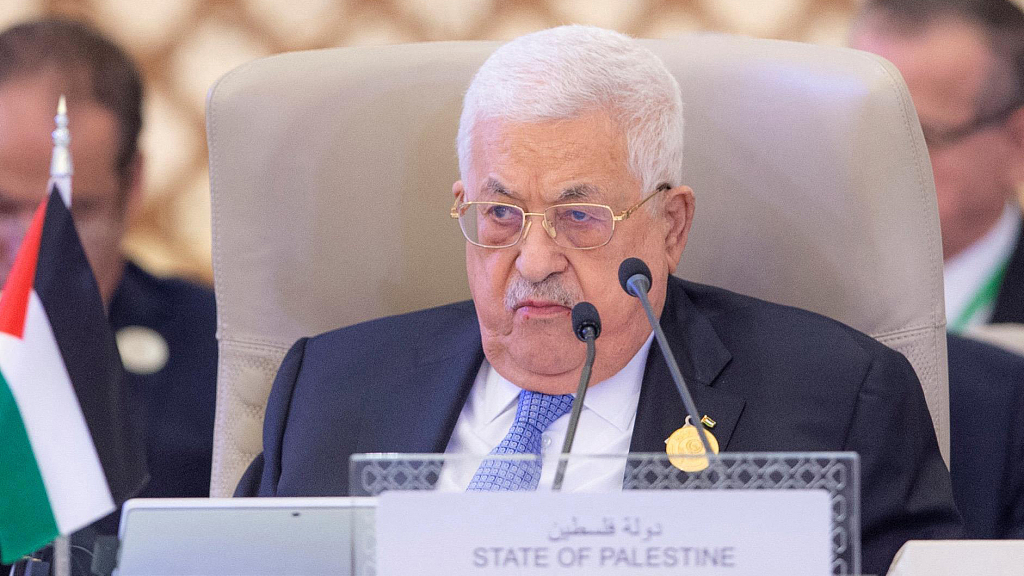
Palestinian President Mahmoud Abbas attends the Arab League Summit in Jeddah, Saudi Arabia, May 19, 2023. /CFP
Palestinian President Mahmoud Abbas attends the Arab League Summit in Jeddah, Saudi Arabia, May 19, 2023. /CFP
Editor's note: Bobby Naderi, a special commentator on current affairs for CGTN, is a London-based journalist, guest contributor in print, radio and television, and documentary filmmaker. The article reflects the author's opinions, and not necessarily the views of CGTN.
There is some optimism for a potential détente between Israelis and Palestinians among the depressing news that predominates in Western media. Recent events, such as the state visit to China by the President of the Palestinian Authority Mahmoud Abbas, imply that China might be a key player in mediating a two-state solution and aiding peace negotiations.
It's not difficult to see how Beijing could bring Israelis and Palestinians together for the prosperity and security of both nations, especially in light of China's successful role in mending ties between Iran and Saudi Arabia.
The latest trip to China by President Abbas marks a significant development in the long-standing friendship between China and Palestine. China has persistently advocated for the restoration of the Palestinian people's legitimate national rights and demonstrated support for their just cause. The invitation that Chinese President Xi Jinping gave to President Abbas demonstrates Beijing's dedication to bringing about peace and stability in the Middle East.
Obstacles to overcome
China has established itself as a reliable mediator in the Middle East thanks to its expanding influence in the region. In the past, the United States acted as the primary power broker, but China's rise offers a new viewpoint and an alternate strategy to resolve disputes.
Beijing was able to successfully navigate complicated regional dynamics and a shifting international order when it successfully mediated the re-establishment of relations between Iran and Saudi Arabia in March. China's recent success in promoting a rapprochement between Saudi Arabia and Iran suggests that it can also help other countries in the region achieve diplomatic breakthroughs. By promoting a two-state solution, China may build on this success and relaunch the Israeli-Palestinian peace process.
China's Israeli-Palestinian mediation offers hope for a fresh age of communication and cooperation. China can help Israelis and Palestinians realize that they have a lot to gain from a secure and prosperous future predicated on the principles of a two-state solution. Beijing can create an atmosphere that is conducive to productive negotiations and act as a mediator between the two sides by utilizing its expanding influence and diplomatic clout.
The decades-long Israeli-Palestinian has caused widespread human suffering and dashed hopes for peace and stability in the Middle East. It is crucial that both Israelis and Palestinians acknowledge the need for normalizing relations in the face of these difficulties.

People run to take cover during clashes with Israeli forces in the West Bank city of Jenin, January 26, 2023. /Xinhua
People run to take cover during clashes with Israeli forces in the West Bank city of Jenin, January 26, 2023. /Xinhua
Importance of normalization
Beyond simple diplomatic gestures, normalization between Israelis and Palestinians is the only way to end the cycle of antagonism and mistrust. Both parties may lay the groundwork for an everlasting peace by promoting communication, cooperation, and understanding. Increased interpersonal communication, economic cooperation, and cultural interchange would be made possible by normalization, fostering an environment of respect and commonality.
Beyond the borders of the two countries, the Israeli-Palestinian conflict has far-reaching repercussions. It has exacerbated conflicts and heightened tensions throughout the region, providing an ideal environment for extremism and instability. Palestinians and Israelis can act as rays of hope for their neighbors by repairing their relationship, setting a good example for them and ushering in a new era of regional cooperation.
Extremist ideologies have flourished as a result of the Israeli-Palestinian conflict's unresolved status. The re-establishment of regular interactions can help undermining these forces by presenting a different story focused on discussion, negotiation, and cohabitation. Both Israelis and Palestinians can contribute to the larger fight against extremism by tackling the underlying causes of radicalization, fostering a more secure and prosperous area for all.
For both Israelis and Palestinians, normalization has the ability to open up economic opportunities and promote prosperity as well. Greater economic stability, higher living standards, and job creation can result from increased trade, investment, and cooperation in a variety of industries. Such advantages would enhance not just the lives of those directly affected but also have a good knock-on effect throughout the region.
Building trust and fostering reconciliation between Israelis and Palestinians begins with normalizing ties via China's mediation. Both parties can address historical grievances, acknowledge the sufferings of individuals and communities, and try to mend the wounds of the past through direct interaction and mutual acknowledgement. This process creates an atmosphere whereby cohabitation is not only conceivable but also desirable, which Beijing insists is necessary for long-term peace and stability in the entire region.
The significance of normalizing Israeli-Palestinian ties for regional stability and security has long been acknowledged by China. The world's second largest economy has made enormous investments to help the two parties communicate and negotiate. It is imperative that both Israelis and Palestinians take advantage of this new-found backing and participate in genuine, fruitful engagement, building on the current momentum for peace. Only by working together in this way will the area be able to move closer to a time when all of its citizens can live in safety and harmony.
(If you want to contribute and have specific expertise, please contact us at opinions@cgtn.com. Follow @thouse_opinions on Twitter to discover the latest commentaries in the CGTN Opinion Section.)